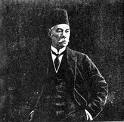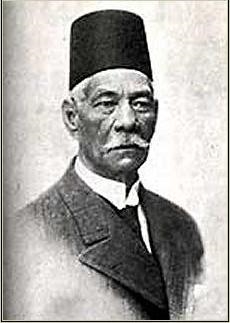 |
| Saad Zaghlul (http://weekly.ahram.org.eg/2001/555/chrncls.htm) |
Saad Zaghlul Pasha was an Egyptian cultural hero because he never gave up on believing that Egypt should be an independent country. In a 1924 interview with Time Magazine Zaghlul said:
"I will find myself in the face of the greatest power in the world. I support myself upon the confidence of my country and the justice of my cause. I feel myself stronger. I have the greatest hope of arriving at a satisfactory accord; but if success does not reward my efforts, I will continue to fight by the way of law and justice."
He worked very hard to gain Egypt’s independence back from the British despite many penalties. Zaghlul was a leader and spokesperson for the nationalist movement in the early 1900’s. He was well known for bringing the Egyptian people together for a common cause. Men and women of all ages, religions and social classes were inspired by Zaghlul and came together to fight for Egypt's independence through peaceful demonstrations.
Saad Zaghlul was born in 1860 and grew up in the village of Ibiana in the Nile Delta; he was part of a middle class family in the Egyptian countryside. He had a traditional Islamic education as a kid but then he grew up to study law at the Egyptian school of law then at the Muslim university of Al- Azhar in Cairo. Even though Zaghlul had a traditional Muslim education he was against Muslim fundamentalism and going back to old fashioned habits and ways; on the contrary he was a modernist. He believed that Egypt should grow and thrive with new innovations. Before he began his political activities he was close to the “Umma party” which was against fundamentalism.
Zaghlul's career all revolved around politics and leadership. He was appointed minister of education in 1906 and minister of justice in 1910. In 1913 he resigned from all his appointments to join the opposing legislative assembly, which he was then elected to lead. At the end of World War I Zaghlul headed an Egyptian nationalist movement. He led a special delegation that demanded full independence from the British. This delegation was the origin of the Wafd Party ("Wafd" in Arabic means delegation), one of Egypt's oldest and most important political parties which still exists today.
 |
| Saad Zaghlul (http://i-cias.com/e.o/zaghlul_s.htm) |
In the fight for Egypt's independence, Saad Zaghlul and three other nationalists that demanded independence were exiled to Malta in March of 1919. When they came back from Malta one month later they went to Paris, France to present their case to representatives from allied countries. With no luck Saad Zaghlul returned to Egypt where he protested and argued once again about the independence of Egypt. The British did not hesitate to exile them once more to Aden, the Seychelles and Gibraltar in 1922. Zaghlul returned in 1923 and tried again until 1924 when he led his delegation to victory and partial independence from the British. Egypt had its first parliamentary elections in January 1924. Zaghlul was then appointed Prime Minister. Saad Zaghlul is a great role model because of his perseverance and determination. For most Egyptians he is a symbol of honor, respect and patriotism
Zaghlul later resigned as Prime Minister because the British striped him of his power thus humiliating him. Zaghlul had a lot of pride and resigned instead of being a puppet to the British. In the last two years of Saad Zaghlul's life he served as a Speaker in the parliament representing the Wafd party. He died in September of 1927 which affected the nationalist movement greatly. Egypt got full independence from the British 20 years after Zaghlul's death but he will always be remembered as the one who made it happen.
Page created on 12/2/2008 12:00:00 AM
Last edited 12/2/2008 12:00:00 AM
